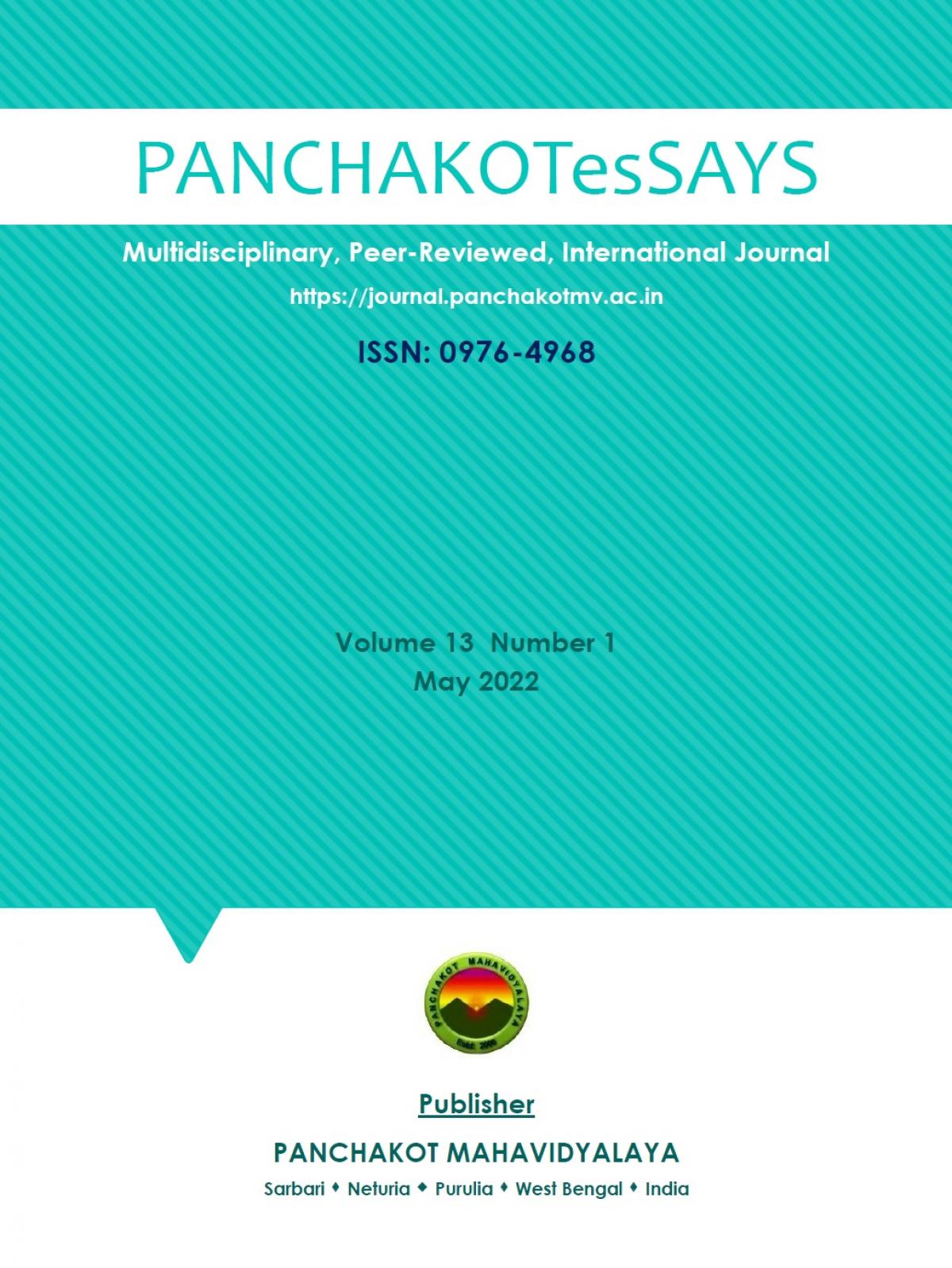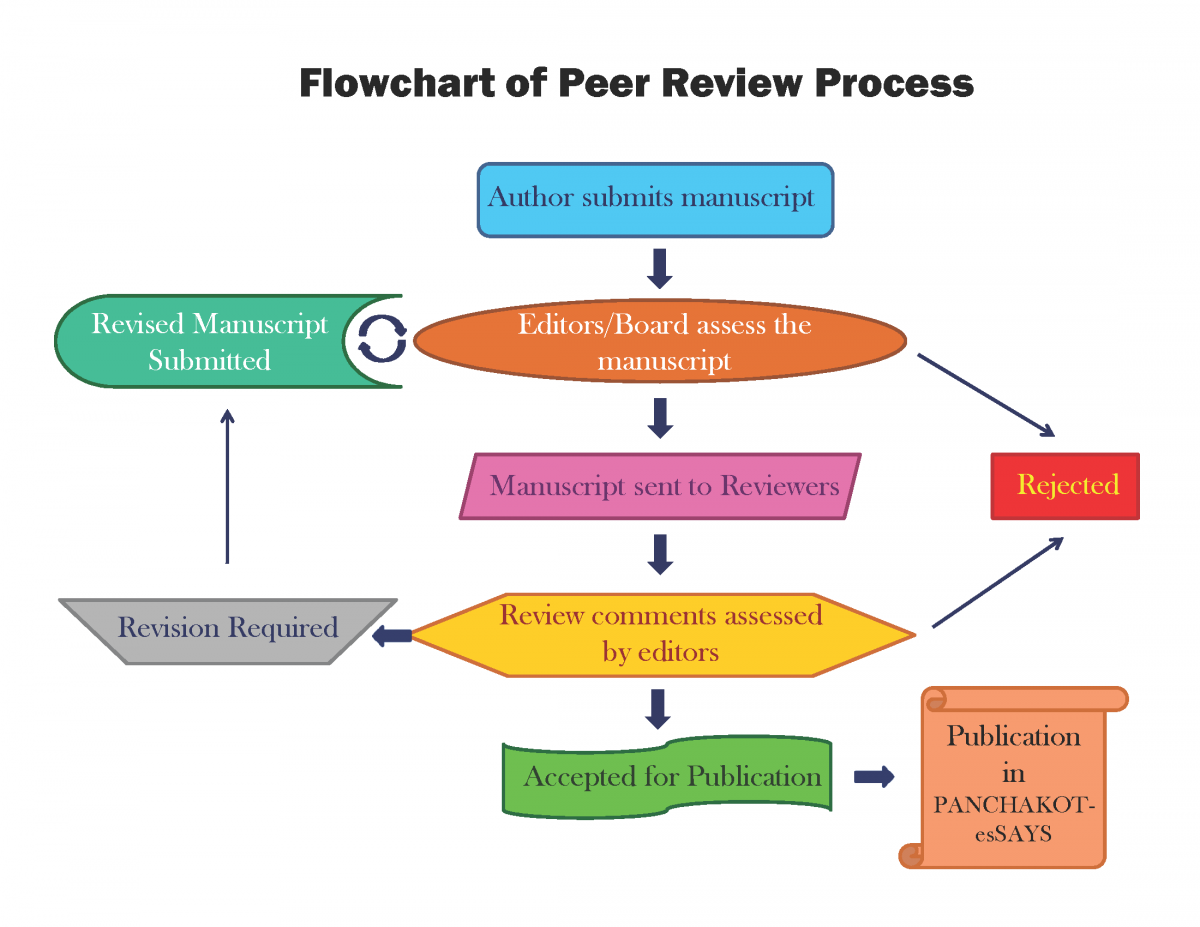
PANCHAKOTesSAYS (Print ISSN: 0976-4968) is a multidisciplinary, multilingual, peer reviewed international journal that welcomes original research contributions from a variety of disciplines and interdisciplinary perspectives. After its launching in 2010, this journal has been publishing regular articles on emergent scientific phenomena, current economic and socio-political affairs, historical and cultural events, environmental issues and many more. Since the last decade, this journal received wide-acceptance and significant acknowledgement from scholars, educationists, academicians and researchers of various universities and institutions. The Journal publishes original scholarly articles, research communications and review articles.
Frequency: The journal is published bi-annually by Panchakot Mahavidyalaya, Purulia, West Bengal, India. The Summer Issue is published in the month of May, while in November the Winter Issue emerges.
Subject Area: Articles are published from various disciplines of Arts, Science and Commerce streams.
Nature of Publication: Print only. However, an online repository for the published articles is available at the journal website: https://journal.panchakotmv.ac.in/index/18042021001PAN/Current_Issue
Review Process: Double blind peer review.
Year of Foundation: 2010
Volumes published so far: The journal regularly publishes its issues as per the defined frequency. 15 volumes published so far.
Fees: The fee structure is revisible as per the decision of the college journal committee.
Submission Fee: INR 100/-
Publication Fee: INR 1000/-
Fee Structure : The reviewing process at PANCHAKOTesSAYS involves three stages:
Stage One: In this stage, a preliminary review is conducted by the editorial committee members and, in certain cases, subject experts.
Stage Two: The submission is checked using similarity-checking software, and the result is shared with the author. For submissions in vernacular languages, a reviewer will manually assess similarity. If the submission progresses to the second stage, the author(s) must pay a processing fee of ₹100/- INR (Submission Fee). This fee is non-refundable, even if the submission is rejected in the final stage.
Stage Three: After completing the second stage, the submission is sent to a reviewer for the final round of review. Once the review is complete, the final report is shared with the author. If the submission is accepted for publication, the author(s) must pay a publication fee of ₹1000/- INR (Publication Fee). This fee is non-refundable under any circumstances once the payment is made.
Whether UGC CARE enlisted: No
 PEER REVIEW PROCESS
PEER REVIEW PROCESS
The submitted manuscript must be an original work of the author that has neither published nor even communicated to any another journal. The received manuscripts are checked for plagiarism with dedicated anti-plagiarism software. Plagiarism is unethical and unacceptable in all its form. Those manuscripts that constitute plagiarism are immediately rejected. The rejected manuscripts are not reconsidered for publication. The selected articles are scrutinized for data authenticity as well as reliability, and are rejected by the editorial board/editors if found guilty of misinformation or unethical research. The manuscripts are evaluated exclusively for quality of research and are subjected to strict and blind peer review process. The suitable manuscripts are sent to independent national or international referees (subject experts) chosen by the editorial board. The manuscripts sent for review are treated as confidential documents. The reviewers assess the overall quality of the article considering several factors e.g., the relevance and importance of the research problem, originality and reliability of data, acuteness of observations, data interpretation and analytical methods and tools, indigenousness and applicability of the results etc. The reviewers inform the editors, in case, any substantial corrections, moderations or major/minor revisions of the manuscripts are necessary. The suggested moderations or revisions of the manuscript are performed at the authors’ end and the resubmitted article is accepted for publication in our journal.
Notes to contributors: The publication of articles through peer review process is a joint effort by all the involved parties: authors, reviewers, editors and board members. Their responsibilities and liabilities, which make the journey of our journal successful, are highly appreciated.
Authors’ Responsibilities:
Reviewers’ Responsibilities:
Editors’ Responsibilities:
Plagiarism Policy:
Plagiarism is copying text, data, tables, figures, graphs, results, analysis etc. from already published articles without proper citation and claiming or presenting them as someone’s own original research work. Plagiarism is the duplication of information and it prevents the creation of new knowledge. It counters the fundamental purpose of research where each article contributes a little more to our existing conception and understanding. Therefore, intentional or not, plagiarism is unethical and unacceptable in all its forms. Even recycling or reusing one’s own previously published research work without proper citation is considered as an immoral task and is treated as self-plagiarism. An author must understand that self-plagiarism is also a serious violation of publisher copyright.
PANCHAKOTesSAYS has strict policy against plagiarism. Any submitted article containing more than 10% similarities to a published article without proper citation is treated as plagiarized. The authors of such articles are offered a chance for rebuttal or resubmit a revised manuscript. However, the article is retracted if evidence of plagiarism is found, by any chance, after acceptance or publication of the paper. The authors of such articles are debarred from publishing in PANCHAKOTesSAYS for a period as decided by the editorial board.
To prevent such unethical practices each submitted article is examined by dedicated anti-plagiarism software.
Copyright
Copyright describes the rights related to the publication and distribution of original works. From a publisher's perspective, copyright governs how authors, publishers and the general public can use, publish and distribute published materials.
To publish a manuscript in PANCHAKOTesSAYS, Panchakot Mahavidyalaya requires publishing rights via publication agreement between the Corresponding Author and the publishing authority. This agreement is accepted by the Corresponding Author before the manuscript is accepted for publication and it deals with publisher’s and authors' rights and obligations concerning a particular manuscript. By accepting this agreement authors retain significant rights to share their publications and reuse all or part of the article in other works created by the author(s), provided the original publication in a PANCHAKOTesSAYS journal is acknowledged through a proper citation. The copyright grants Panchakot Mahavidyalaya to publish, reproduce, distribute, display, and store the article in all forms, formats such as print, digital or electronic form.
Contact Us: Panchakot Mahavidyalaya, Sarbari, PO - Neturia, Dist - Purulia, West Bengal, India - 723121
Queries: mail at: journal@panchakotmv.ac.in
Feedback: Please submit feedback at the above emial id. We collect feedback from authors, readers and subscribers.
Request for Special Issue: Please write to us at journal@panchakotmv.ac.in
Google Scholar
ResearchGate
Academia
JournalTOCs
SKBU Journals
Scopus
Web of Science
UGC-CARE
Last date for manuscript submission
31-03-2025
Peer Review and Corrections
Will be communicated via e-mail
Acceptance of Manuscript
Will be communicated via e-mail
Upcoming Issue
May 2025